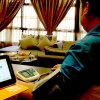The Eastern Health Alliance (EHA) and Changi General Hospital (CGH) are piloting a new tele-health programme, which will see healthcare professionals remotely monitoring the recovery of heart failure patients.
In a media briefing on Thursday (Sep 4), both organisations said patients enrolled in the programme will be equipped with devices such as a tablet computer and a blood pressure monitor. With these, they will measure their weight, pulse and blood pressure daily and the information will be transmitted to a central system for monitoring.
Touted to be the first of its kind in Singapore, the programme will allow healthcare professionals to monitor and provide assistance to patients after they are discharged and back home.
The organisations said the recovering patients can also view educational videos on the tablets to better manage their conditions and reduce the risk of hospital readmission and, ultimately, premature death.
Heart failure patients are frequently readmitted to hospital. Forty per cent of such patients are readmitted within 12 months, CGH said. A key reason for the high readmission rate is that patients do not adhere to treatment plans, which may include taking medication consistently and monitoring their weight daily.
EHA and CGH worked with Philips Healthcare to develop the programme and tailor it for the local population, such as making content available in English, Mandarin and Malay. The pilot was rolled out on Jun 26 this year and currently has five patients onboard. The healthcare service providers aim to have about 160 heart failure patients on the programme by October next year.
As one of the participants on the pilot programme, Mr Mohamed Faizul Wahid was provided with devices such as a blood pressure monitor and a tablet. Every morning, the 34-year-old measures his weight and blood pressure. The readings are then sent to a team of healthcare professionals from EHA’s Health Management Unit, to monitor the readings and offer help early when there are signs of deterioration.
“This is a very good check system. Previously, when I did not have all these, I tended to not bother because of my hectic schedule, and that was the situation that resulted in my heart failure condition,” said Mr Mohamed Faizul.
Dr Gerard Leong, programme director and senior consultant at Changi General Hospital’s Department of Cardiology, said the automated transfer of clinical data like blood pressure, heart rate and pulse rate gives nurse tele-carers a more comprehensive view of the patients’ parameters over time.
“Over seven days or 28 days, we can then see a pattern,” he said. “Since it is automated, it also allows our nurse tele-carers to focus on more important things like patient contact, talking to the patients and educating the patient, so there is a more productive use of their precious time.”
Source: Channel News Asia
Heart Failure Patients Monitored From Home In Pilot Programme

